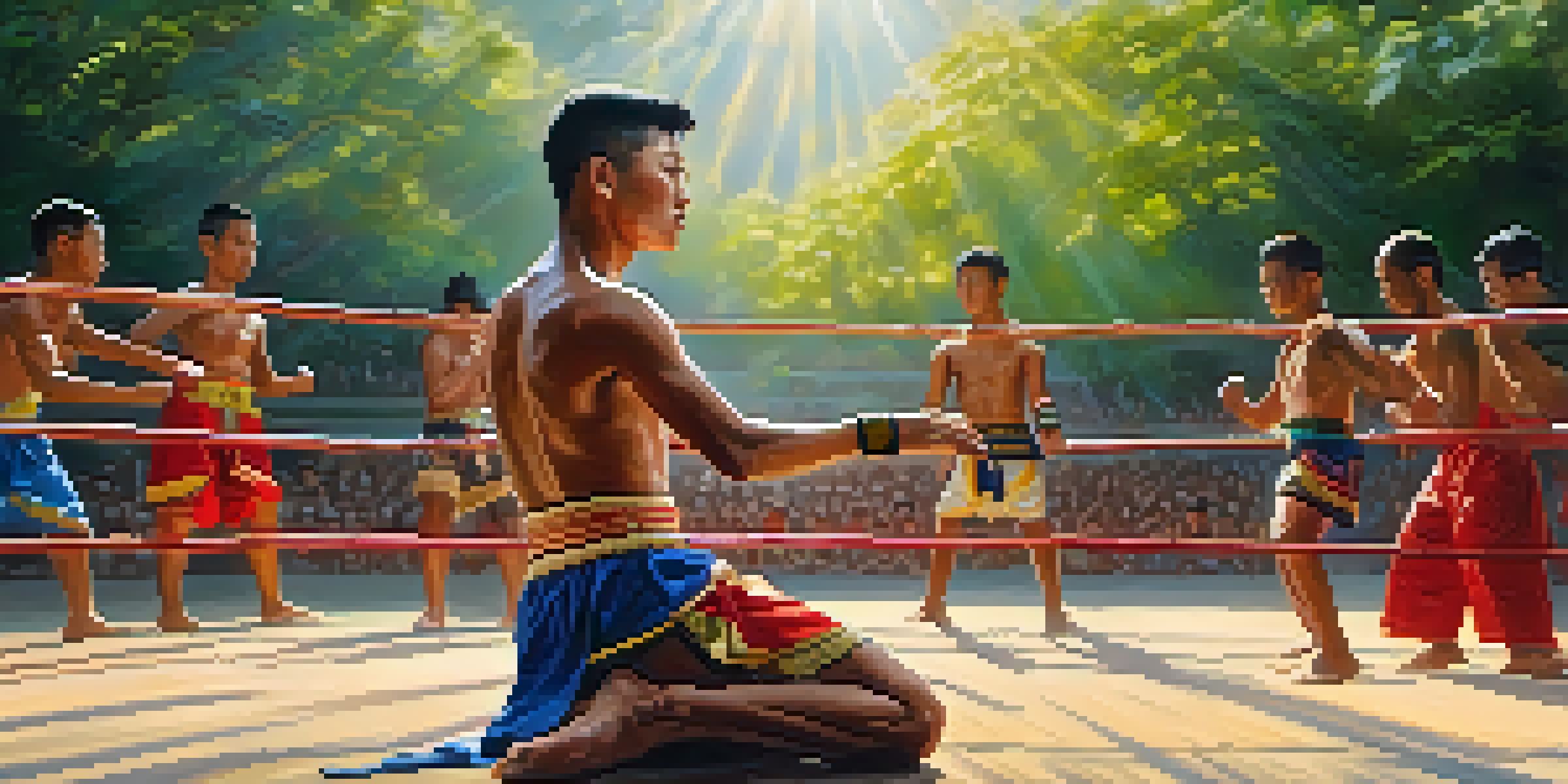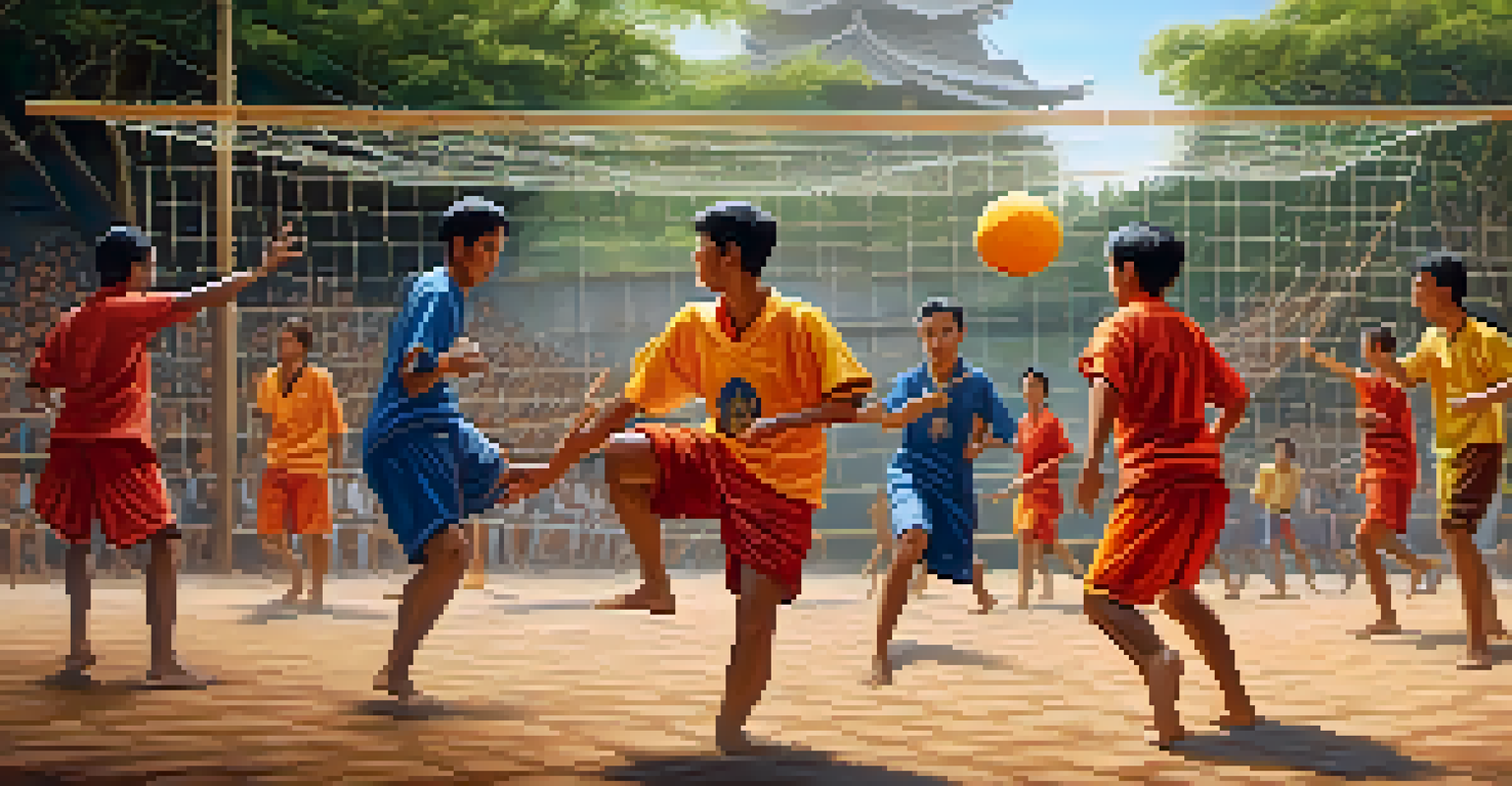The Influence of Buddhism on Thai Sports and Games

Buddhism: The Heartbeat of Thai Culture and Sports
Buddhism is not just a religion in Thailand; it's a way of life that influences every aspect of culture, including sports. The teachings of the Buddha emphasize mindfulness, discipline, and respect, which are crucial attributes in both athletes and sportsmanship. As a result, many traditional Thai games are infused with spiritual significance, reflecting the interconnectedness of physical and mental well-being.
True love is born from understanding.
In many sports, rituals and prayers are performed to honor the Buddha and seek blessings for success. For instance, before a Muay Thai match, fighters often perform the 'Wai Khru' dance, which is a tribute to their teachers and the Buddha. This ceremony not only showcases respect but also instills a sense of focus and calmness in the athletes, aligning their minds with their physical efforts.
The influence of Buddhism can thus be seen as a guiding force in Thai sports, encouraging athletes to cultivate virtues like humility and perseverance. This spiritual foundation helps create a unique sporting culture that values not just winning, but the journey and personal growth that comes with participating in sports.
Mindfulness and Focus: Lessons from Buddhist Practices
Mindfulness, a core principle of Buddhism, is increasingly recognized for its benefits in sports. Athletes who practice mindfulness can enhance their focus and reduce anxiety, which is essential for peak performance. Techniques such as meditation and breathing exercises, rooted in Buddhist teachings, are often incorporated into training regimens to help athletes stay present and engaged.

For example, Thai boxers frequently use meditation to clear their minds and concentrate on their upcoming fights. This mental clarity allows them to react swiftly and effectively in the ring, showcasing how Buddhist practices can translate into tangible benefits in the world of sports. By integrating these techniques, athletes can achieve a state of flow, where performance feels effortless and intuitive.
Buddhism Shapes Thai Sports Culture
Buddhism influences Thai sports by instilling values like mindfulness, respect, and humility in athletes.
Moreover, the emphasis on mental discipline from Buddhism encourages athletes to approach their training with dedication and resilience. This focus not only helps in their sporting endeavors but also fosters personal development, teaching them valuable life lessons about patience and commitment.
Traditional Games: Reflecting Buddhist Values
Many traditional Thai games, such as 'Sepak Takraw' and 'Chol Chalo', embody Buddhist values and principles. These games often promote teamwork, cooperation, and respect among players, which are integral to Buddhist teachings. The spirit of community and shared enjoyment in these games reflects the collective values encouraged by Buddhism, fostering a sense of unity and harmony.
Success is not the key to happiness. Happiness is the key to success. If you love what you are doing, you will be successful.
For instance, 'Sepak Takraw', a game played with a rattan ball, emphasizes coordination and agility while requiring players to work together seamlessly. The camaraderie built during these games highlights the importance of mutual respect and support, resonating with the Buddhist belief in interconnectedness. Players learn that their actions affect not only themselves but also their teammates and opponents.
Therefore, traditional Thai games serve as a practical application of Buddhist teachings, illustrating how sports can be a medium for expressing and reinforcing spiritual values. This connection deepens the cultural significance of these games, making them not just a form of entertainment, but a celebration of shared values.
Buddhist Festivals and Sports: A Harmonious Blend
Buddhist festivals in Thailand often include sports and games as part of the celebrations, showcasing a vibrant blend of spirituality and physical activity. Events like the 'Songkran Festival' feature traditional games that not only entertain but also reflect cultural heritage and Buddhist teachings. This fusion of sports and spirituality creates a festive atmosphere that honors both the community and the Buddha.
During these festivals, participants engage in various activities that emphasize cooperation and joy. Whether it's traditional boat races or local wrestling, these sports serve as a medium for community bonding and cultural expression. The underlying Buddhist principles of compassion and unity are evident as people come together to celebrate, reinforcing social ties and cultural identity.
Mindfulness Enhances Athletic Focus
Practicing mindfulness techniques, rooted in Buddhism, helps athletes improve focus and reduce anxiety.
Moreover, these events offer athletes a chance to honor their skills in a joyous context, reminding them that sports can be both a competitive endeavor and a means of spiritual expression. This harmonious blend of Buddhism and sports during festivals exemplifies how cultural practices can enrich the experience of athleticism.
Respect and Humility: Core Values in Thai Sports
Respect and humility are two essential values in Buddhism that significantly influence Thai sports culture. Athletes are taught to respect their opponents, coaches, and the spirit of the game, which fosters a healthy competitive environment. This approach not only elevates the integrity of sports but also reflects the teachings of the Buddha regarding compassion and understanding.
For example, in Muay Thai, fighters bow to the ring and their opponents as a sign of respect before the match begins. This ritual underscores the importance of humility, reminding athletes that their skills are a gift and should be used responsibly. Such practices create a culture where winning is not the only goal; rather, the journey and the respect shown to others are equally valued.
Through these principles, Thai sports encourage athletes to develop a strong moral compass, guiding them both on and off the field. By embracing respect and humility, they become not only better competitors but also better individuals, embodying the values that Buddhism teaches.
The Role of Temples in Promoting Sports
Temples in Thailand play a crucial role in promoting sports and physical activities within the community. Many temples serve as community centers where locals gather for sports events, fostering a sense of belonging and unity. This connection between spirituality and sports reinforces the idea that physical health is an essential component of overall well-being, as emphasized in Buddhist teachings.
For instance, many temples host traditional martial arts classes or organize local tournaments that attract participants of all ages. These activities not only promote physical fitness but also encourage social interaction and community spirit, creating a safe and supportive environment for everyone involved. The temple's involvement underscores the importance of nurturing both the body and the spirit.
Temples Foster Community Sports
Temples in Thailand promote sports as community centers, linking physical health with spiritual well-being.
As such, temples become a hub for cultivating athletic talent while instilling Buddhist values in the community. This synergy between spirituality and sports helps build a well-rounded society where individuals can thrive both physically and spiritually, illustrating the holistic approach of Buddhism.
Buddhism's Lasting Impact on Future Generations of Athletes
The influence of Buddhism on Thai sports continues to shape future generations of athletes. Young athletes are taught not only the skills of their respective sports but also the values of mindfulness, respect, and discipline that Buddhism advocates. This holistic education prepares them to face challenges both in sports and in life, instilling a strong moral foundation.
As these young athletes grow and compete, they carry forward the teachings of Buddhism, integrating them into their training and competitive mindset. This ongoing legacy ensures that the principles of compassion and humility remain at the forefront of Thai sports culture, promoting a positive environment for all participants. It creates a cycle where the values learned in sports translate into broader societal benefits.

Ultimately, the lasting impact of Buddhism on Thai sports encourages a generation of athletes who are not only skilled but also grounded in ethical conduct and personal growth. As they strive for success, they remain reminded of the importance of their journey and the values that guide them, ensuring that the spirit of Buddhism continues to thrive in the world of sports.